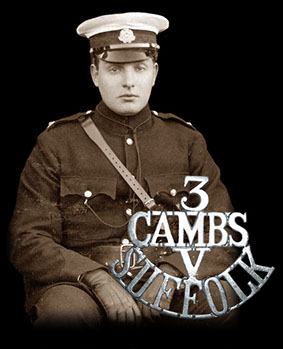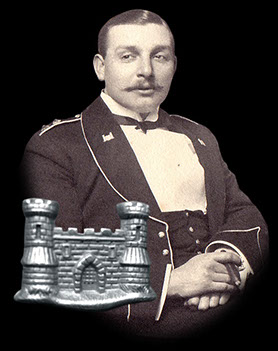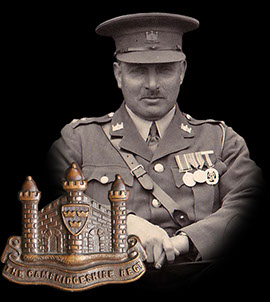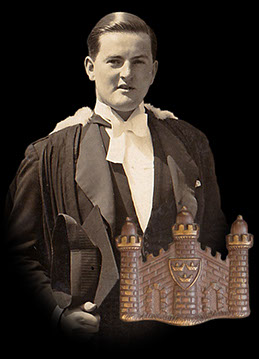Colonel William Philip Cutlack CB TD
Known by his middle name, Philip, he was born August 5th 1881 at Littleport, the son of the affluent brewery owner and local Justice of the Peace, William Cutlack. Philip’s early childhood years were spent at the family home in Littleport, now the Grange Care Home, but when of age he was sent to Felsted Boarding School. During his time at Felsted he developed a love of sports and became highly involved with the school’s Cadet Corps.
On leaving Felsted Philip was accepted into Pembroke College, Cambridge and he started his studies there in 1900. Keen to continue with his interests in the military he joined the Cambridge University Rifle Volunteers and served as part of their Mounted Infantry Section. Captivated by the events in South Africa during the ongoing Second Boer War the CURV’s Mounted Infantry Section was heavily influenced by both the concept and imagery of the Boer Kommandos. Philip thrived at Pembroke, joining several societies alongside his CURV commitments.
Philip gained his BA from Cambridge in 1903 and returned to Ely where he joined his father’s brewery business, Cutlack and Harlock Ltd. In February 1904 the young graduate was offered a commission with the Volunteers and he joined H (Ely) Company, 3rd Volunteer Battalion, The Suffolk Regiment. Under the guidance of the young Captain Archer, Philip fitted in well and retained his commission when the Volunteers disbanded and reformed as the Territorial Force in 1908.
In 1911, Philip, now a 29-year-old director of Cutlack and Harlock, married his fiancée Dora Dormer and the couple moved to Glebe Lodge, Hills Road, Cambridge. In December 1911 Captain Archer was promoted and the command of the Ely Company was passed to Lt Cutlack. He continued in this role until March 1913 when he decided to resign his commission.
Seventeen months after Philip had resigned his commission the highly anticipated war in Europe began. In early October 1914 the former Lt Cutlack volunteered to return to the Colours and was given the rank of Temporary Captain. Posted to the recently formed 2/1st Battalion (initially called the 1st Reserve Battalion) Philip was soon made Adjutant and promoted to Major. In February 1916 he was appointed Second in Command and then given command of the Battalion in May. Four months later orders came through that he leaving for the Western Front.
Major Cutlack arrived in France at the end of September 1916 and he was initially posted to the 6th Battalion, Sherwood Foresters before being attached to the 2nd Battalion, Scots Fusiliers. These short posting were all intended to give him some front line experience and it was under this pretense that he was given command of the 1st Battalion, East Lancashires for around a month in December 1916 to January 1917. After his short stay with the East Lancs, Philip was moved back from the front line area and was given the position of Commandant for the Le Treport area.
After the Armistice was declared Philip remained in France for a time, supervising the demoblisation of countless British soldiers who moved through the depots in the Dieppe area. Finally his orders came through and he returned home, his uniform was once again put away. In the post-war years the Cambridgeshire Regiment was reformed as part of the newly created Territorial Army and Philip once again answered the call and returned to the Colours for a third time.
Gazetted Lieutenant Colonel in March 1924, Philip succeeded the legendary wartime CO Lt-Col Clayton and was given command of the Battalion in 1925. Shortly after this, tragedy struck the Cutlack family when his beloved wife and mother to his two children, Dora, died from an allergic reaction to a bee sting.
After four years as the Commanding Officer of the 1st Cambs Lt-Col Cutlack stood down. He remained heavily involved with the TA in various capacities and in July 1929 was promoted to the rank of Colonel. The time freed up by relinquishing his command was quickly taken up once again by his appointment as Deputy Lieutenant for Cambridgeshire and Huntingdonshire and he later went on to serve as High Sheriff from 1934-35.
After the loss of his first wife in 1925 Philip married again in 1926. This time to the daughter of the former Cambs officer, Samuel Marshall Jonas, named Olga Vavasour Jonas. After ten years the marriage ended in divorce, shortly after which he married for the third and last time to a widow named Eileen Hills.
In 1939 as war in Europe once again erupted, Philip, once again, returned to uniform becoming a key figure in the Home Guard holding the position of Zone Commander of the Isle of Ely Home Guard. Before the Second World War his son, Robin, had joined the Cambridgeshire Regiment as a subaltern in the Ely Company. Promoted to Captain early in the War, he was a popular and promising young officer.
Sadly Robin was mortally wounded during the 2nd Battalion’s fierce fighting north of Singapore in late January 1942. Little news escaped from Singapore after the surrender but several letters did reach Philip detailing the loss of his son and the events surrounding it. Using his regimental contacts and by gathering up any available snippets of information he played a key role in discovering the fate of many of the Regiment’s officers when no other word was reaching the UK.
In recognition of his long and dedicated service to the Territorial Army Association and the Home Guard he was appointed Companion of the Order of the Bath in 1943. Remembered as a colourful and larger than life character, Philip spent his later years at his home at Barton Mills. The successful family brewery continued to expand through several mergers, until it was finally sold off in 1957. Col Cutlack died at St Andrew’s Hospital, Northampton on May 8th 1965 at the age of 83.

The young 2nd Lt Philip Cutlack.

Lt Cutlack at a 3VB Regimental Dinner.

Philip Cutlack while CO of the Cambs in 1927.

Col Cutlack's son Robin, killed north of Singapore in 1942.

This site went live on the 14th February 2015 to mark 100 years since the 1/1st Cambs went off to war.
WE WILL REMEMBER THEM
Email us: cambsregt@gmail.com
Copyright 2015, 2016, 2017, 2018, 2019 by Felix Jackson. The information and images on this site should not be reproduced without prior permission.